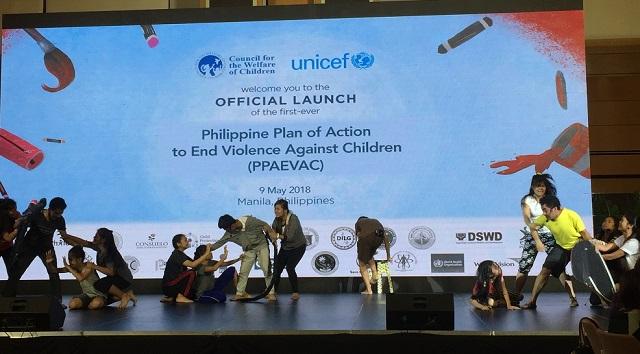1st PHL plan of action to end violence against children launched
The first Philippine Plan of Action to End Violence Against Children (PPAeVAC) was launched Wednesday to kickstart plans to reduce violence against youths in the country.
Emmanuel Layco, Department of Social Welfare and Development (DSWD) Officer-in-Charge, said at the launch event at the Philippine International Convention Center (PICC) that children were directly involved in the PPAeVAC's creation.
"Children themselves gave their inputs on what they believe to be their ideal home, school, and community settings and as they are the focus of this plan, their ideas and insights are invaluable," Layco said.
The PPeVAC aims to translate into action the findings of the National Baseline Study on Violence against Children (NBS-VAC) and A Systematic Literature Review of the Drivers of Violence Affecting Children (SLRD-VAC).
Results from the NBS-VAC showed that three in five children experienced a form of physical violence in various settings, or were reported to have some form of psychological violence in any setting.
One in five children aged below 18 reportedly suffered from some form of sexual violence, with most girls experiencing harm from brothers or cousins, and among males, from cousins, brothers, and fathers.
Cyberbullying is also prevalent as two in five children experience sexual violence or cyberbullying online.
Julia Rees, United Nations Children's Fund (UNICEF) Philippines Country Representative, noted that eight out of 10 children have experienced physical, psychological, and sexual violence across the Philippines.
"For these children, it is perpetuated largely by people they know and trust; it takes place in the home," Rees said, noting that children from poor communities, have disabilities, are from indigenous groups, or are LGBT are particularly vulnerable.
PPAeVAC was developed by the DSWD's Council for the Welfare of Children (DSWD-CWC) in cooperation with UNICEF.

Collaborative action to reduce violence against children
CWC began planning the PPAeVAC as early as 2016, consulting with "43 government agencies, international and local NGOs, FBOs, CSOs, academia and 75 children and their caregivers from different regions of the country."
Six key results were identified as preconditions for reducing violence against children in 2022 from the NBS-VAC and SLRD-VAC:
1) Parents and caregivers are aware of and practicing evidence-based parenting skills and positive discipline with a view to building a safe, nurturing and protective environment (lead agency: DSWD);
2) Children and adolescents demonstrate personal skills in managing risks, protecting themselves from violence, reporting their experience of violence and seeking professional help when needed (lead agency: Department of Education);
3) All children have access to appropriate and quality protective, social, mental, health, legal, economic and judicial services, ensuring that violence and trauma are prevented from recurring (lead agency: Department of Justice and DSWD);
4) A well-developed and effectively managed monitoring and evaluation system for the Philippine Plan of Action to End Violence against Children is in place (lead agency: CWC and Department of Health);
5) All VAC-related laws are in place and successfully enforced (lead agency: CWC); and
6) Multi-stakeholder child protection structures and systems at the national, provincial, municipal, city and barangay levels are operational and effectively functioning (lead agency: CWC and Department of the Interior and Local Government).
A national workshop will be held to determine how the Plan of Action will be evaluated.
Meanwhile, each measure shall be implemented through five INSPIRE strategies.
These strategies include advocating the passage and effective enforcement of laws and policies on VAC; free legal counselling for child victims; and a child-sensitive helpline to allow children to report abuse and receive counseling.
Students in all school levels in public and private schools must also receive age-appropriate life-skills and personal safety lessons while their parents are trained to receive evidence-based parenting skills.
Financing, localization needed
Implementers of the PPAeVAC face challenges in completing all courses of actions detailed within the plan and finding the budget and sources of finances to complete its key objectives.
CWC Executive Director IV Mitch Calayon urged the implementing agencies to keep funding in mind to fulfill their part of the plan of action to end violence against Filipino children.
"Priority funding should be given to the PPAs committed by each agencies," Calayon emphasized. "Funding is essential for complete and smooth implementation of the PPAeVAC."
"A challenge lies ahead especially in the effective monitoring and evaluation of the implementation of our plan. We will need each other to be on deck moving forward," she continued, adding that the CWC is ready to provide the necessary technical assistance.
Apart from financing, the Plan of Action also requires localization down to a town level to fit the needs of each location in the Philippines.
"The next big step for us is to localize the response so that local governments have cost of plans to prevent and respond to violence against children," Rees said. "From national and local executive agencies, we hope they will increase the visibility and the budget of the programs."
The CWC is lobbying to increase its budget by P2.54 million for the implementation of the third PPAeVAC and the localization of the plan. —KG, GMA News



